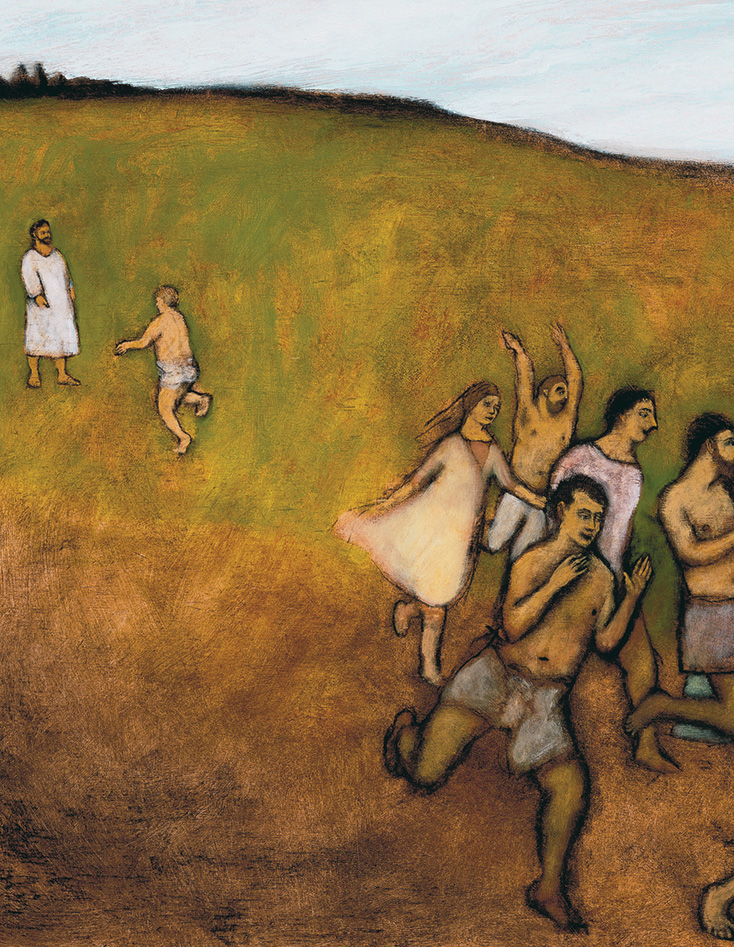Sacred Encounters Lesson Five

Lesson Five:A Person with Leprosy Encounters Jesus
Scripture: Luke 17:11–21
“Jesus challenges us to overcome our prejudices, embrace others, and invite them into the community of faith.”
The Samaritans have lived in the Land of Israel for 3,600 years. Some of us may be familiar with references to the Samaritans in the New Testament, but few of us know who they really are.
A new multi-faceted project by the Yeshiva University Center for Israel Studies introduces the Samaritans to a wide and varied audience and explores how they have managed to survive for millennia despite efforts by conquering powers to erase them. Crucially, the project asks how the Samaritans plan to continue to survive into the future when today they number slightly over 850 people.
The Samaritans are a distinct religious group descended from the northern tribes of biblical Israel, specifically the tribes of Ephraim, Menashe, and Levi. They are not—and have never been —Jewish, Muslim, or Christian. They hold both Israeli and Palestinian citizenship.
“Our programs and projects are about studying Israel in all its amazing complexity. You can’t get more complex than the Samaritans,” said historian Dr. Steven Fine, director of the Center for Israel Studies. The Samaritans Project features a book of academic essays, a full-length documentary film, and an exhibition at the Museum of the Bible in Washington, DC. All three featured parts of the project share the same title: “The Samaritans: A Biblical People.” A Samaritan cookbook and artworks created through a collaboration with the Jewish Art Salon are also part of the project.
The film, by Israeli director and producer Moshe Alafi, premiered in U.S. theaters and via livestream at the Other Israel Film Festival in New York City in 2022. An Israel premiere followed at the Jerusalem Film Festival. “People find astonishing the fact that there are non-Jewish Israelites. It is hard to wrap one’s head around the fact that these people observe all of the Torah’s commandments, yet they are not Jews,” Fine told The Times of Israel.
Alafi, who spent six years shooting the film, said he purposely did not broach topics such as how the Samaritans might handle modern issues like homosexuality or vegetarianism. He also didn’t explicitly deal with the dangers of endogamy or marrying within their own group. “These are a people that live on the seamline between an ancient civilization and a mix of complicated modern geopolitical issues. I think that is much more interesting to focus on,” the filmmaker said. An important part of the exhibition at the Museum of the Bible deals with how Christians, Muslims, and Jews have interacted with the Samaritans throughout history.
Relations between Jews and Samaritans were negative for thousands of years and have only relatively recently improved. Filmmaker Alafi suggested that this can be attributed to the ability to sincerely and appreciatively seek contact with someone “who is me but not me.” Yeshiva University’s Fine believes that this idea can be applied more broadly. “On a social level, it is important for the Jewish world—and for others—to deal with people who are very similar to them and not hate them for it. The Samaritans are a safe place to think about this skill-building. We need to connect with other people and groups on what we share and agree upon, and put our differences in a box,” he said.
Jesus calls us to overcome prejudices and embrace others. How can you, in your setting, learn more about your neighbors and invite them into the community of faith? What differences might you need to put in your box to be able to share what you agree upon with others?
Olive Mahabir
author of the 2023-2024 PW/Horizons Bible Study
Note: This information was accessed from the website of the news organization, The Times of Israel.
************
This blog is the fifth in a series of nine blogs written by the study’s author Olive Mahabir. A new blog will be posted every month between now and April 2024.
Presbyterian Women in the PC(USA), Inc. publishes an annual Bible study. Sacred Encounters is the study for this year. You can purchase a Sacred Encounters Bible study book (HZN23100) and study along with us. Call 800/533-4371 or order online.
